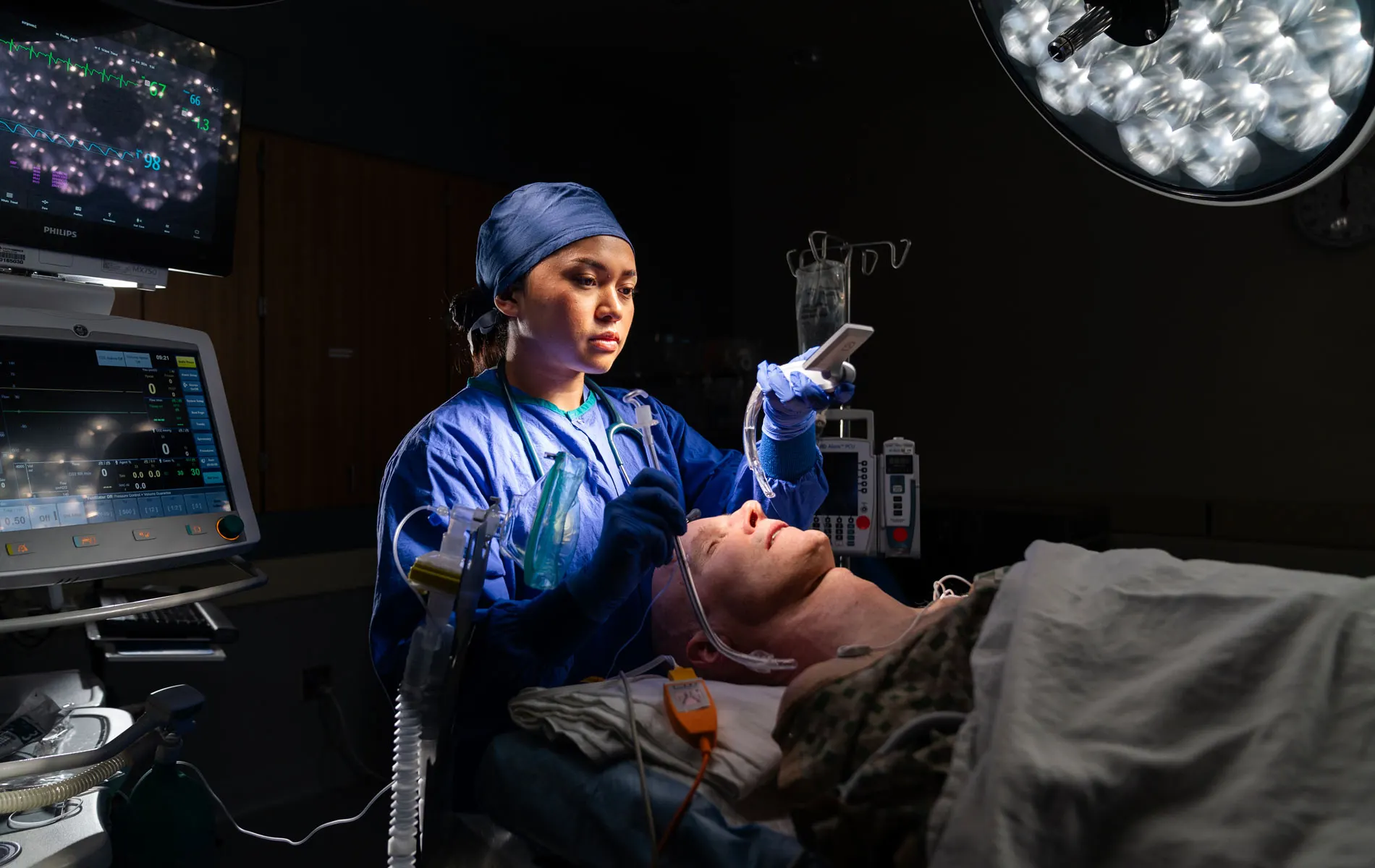
Certified Registered Nurse Anesthetist (CRNA) Program
At a Glance
Degree
Doctor of Nursing Practice: Nurse Anesthesia
Format
Hybrid (synchronous and asynchronous online courses, on-campus immersions each semester, and five clinical residencies)
Students Per Cohort
25 (Year 1); 30 (Year 2); 30 (Year 3)
Semester Credit Hours
90
Cost Per Semester Credit Hour
$1,800* (8-12 credits per semester) - more
Accreditation
Undergoing capability review by COA - more
* All stated financial information is subject to change.

Be Present. Bring Peace.
People facing surgery respond in different ways, but they all need comfort, a sense of peace and the promise of a better future. As a CRNA, you’ll be in a position to provide hope to the patients who need it most – and we’ll help you get there.
At George Fox, you’ll forge lifelong ties with faculty mentors who connect you with in-state placements. You’ll master innovative techniques in a dedicated facility that features advanced labs and a simulated operating room. And you’ll be part of a compassionate community that’s expanding access to high-quality medical care.
By the time you graduate, you’ll bring more than expertise to the table. You’ll bring strength, empathy and an understanding that the heart of exceptional care lies in you.
Set the Standard for Patient Safety & Care
Gain the expertise and depth of sensitivity you need to deliver safe and effective care to every patient you serve.
-
Personalized & Supportive
Experience the Be Known promise with professors who open the door to innovative treatments and professionally transformative clinical experiences.
-
Uniquely Positioned in Oregon
Take advantage of our partnerships with leading healthcare providers throughout the state and complete all of your clinical rotations in Oregon.
-
Collaborative & Mission-Focused
Unleash the power of interprofessional education in simulations and rotations with care teams that share your passion for promoting healthy outcomes and fulfilling lives.
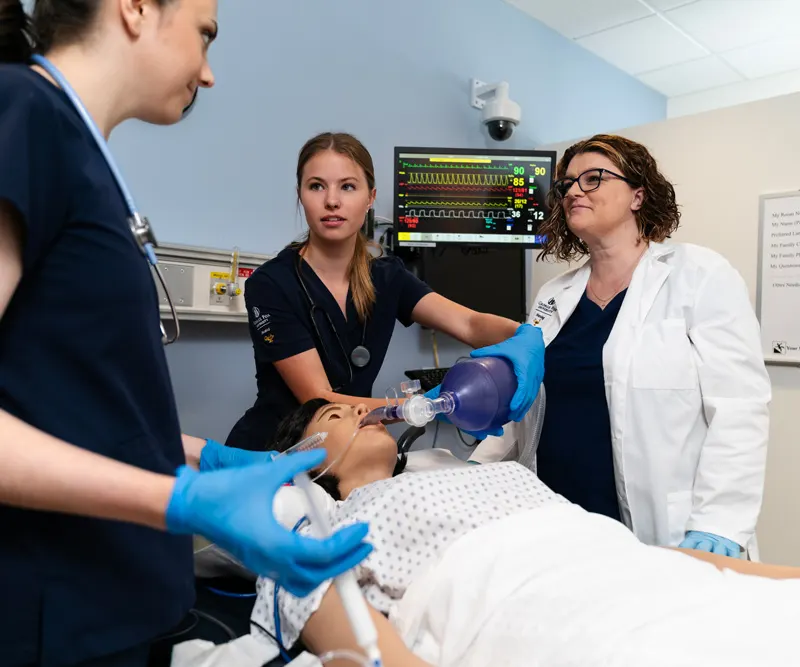
Connect with Caring Mentors
Welcome to a learning community that’s keenly attuned to your needs and goals. If you're looking for housing during your residencies, low- or no-cost options may be available. And you’ll never have to worry about finding your own clinical placement; our faculty view that as an essential part of their job – and one of the many ways they live out our Be Known promise.
From giving you personalized career advice to providing opportunities to pursue your specific interests, our professors will support you, encourage you and bring out the best version of yourself. The way they nurture you will serve as a model for the care you provide as a CRNA throughout your professional journey.
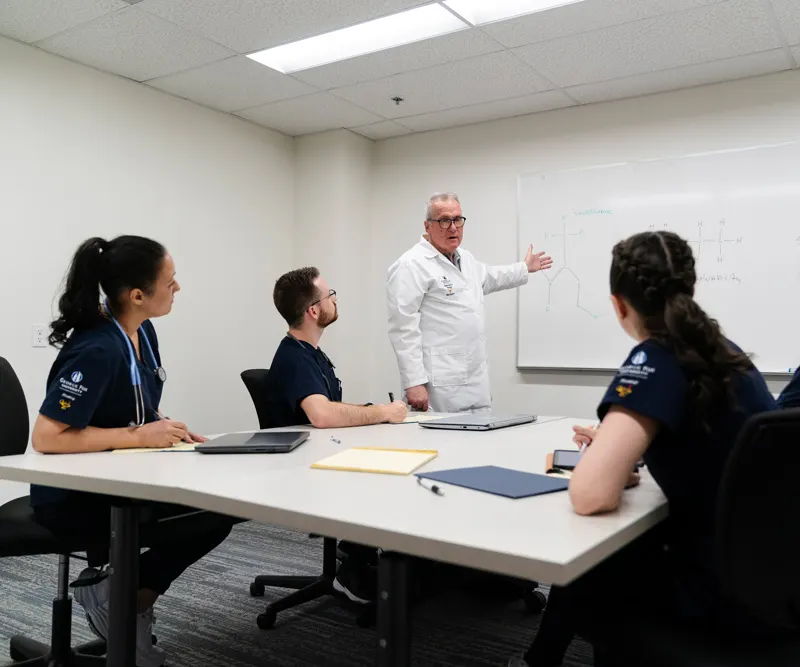
Gain Specialized Knowledge
Learn on the leading edge in online courses, simulations and immersive learning experiences. You’ll explore the ethical, cultural and philosophical dimensions of advanced practice nursing, delve into pharmacology and high-level research, and master the principles of pain management and patient safety.
You’ll also gain expertise operating anesthesia equipment, monitoring airways and managing simulated crises in a 10,000-square-foot facility that includes the latest technology, along with debriefing rooms, conference rooms and faculty offices. The discussions you have with your professors and peers will open your mind to new ideas and illuminate your life’s work.
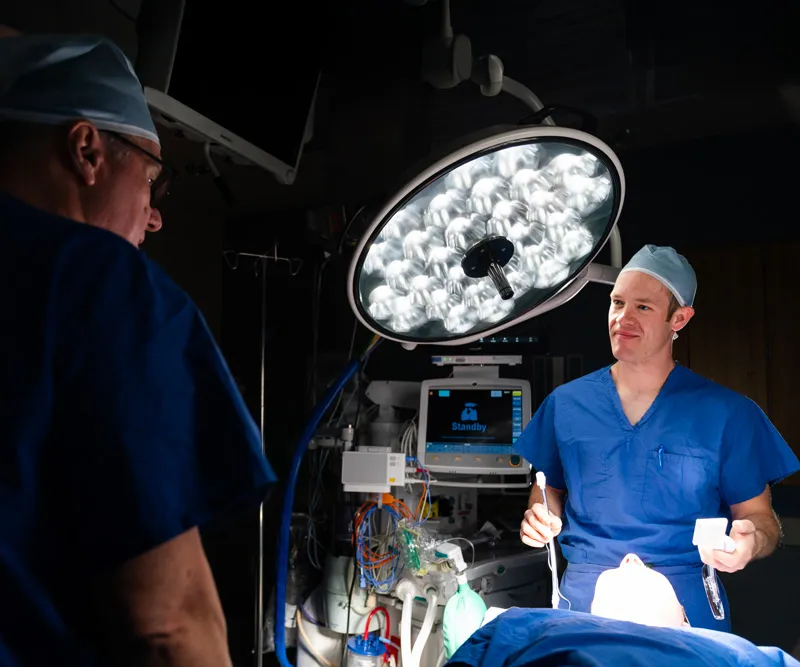
Become a Highly Skilled Clinician
As a student in our Doctor of Nursing Practice: Nurse Anesthesia program, you’ll make a tangible impact on the lives of patients in five clinical rotations – and you won’t have to leave the state to complete your hours, which isn’t the case in other programs. We’ve developed extensive connections throughout Oregon, including a partnership with Providence that encompasses eight hospitals and dozens of medical facilities.
Working under the supervision of experienced clinicians, you’ll analyze medical histories, educate patients and families, and monitor patients during and after anesthesia. You’ll also be a key member of interprofessional care teams in settings as diverse as the patients you serve. Your experiences will expand your professional network, broaden your perspective and prepare you to be a leader in your field.
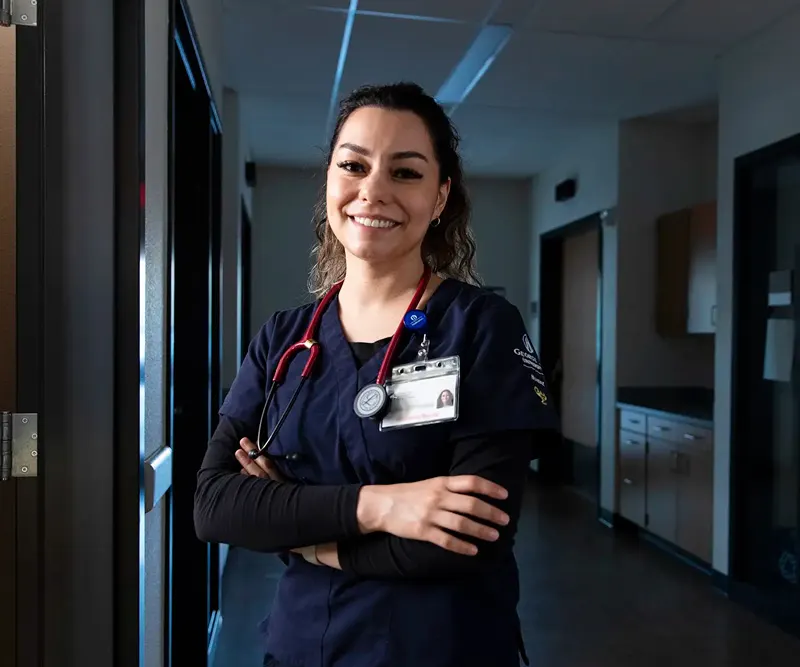
Add to Our Legacy of Service
Our alumni are transforming the field of healthcare as nurses, physician assistants, physical and occupational therapists, and mental health professionals. The upcoming launch of the CRNA program underscores our ongoing commitment to address a critical shortage of clinicians in the region, particularly in underserved areas where people lack access to essential medical care.
The mission of the College of Nursing is to cultivate exceptional clinicians, leaders, scholars and innovators. We prepare graduates to integrate mind, body and spirit to positively impact the world, embodying the service, integrity and compassion exemplified by Christ.
Join us and prepare for a CRNA career that allows you to reach your full potential as a resilient – and compassionate – servant leader.
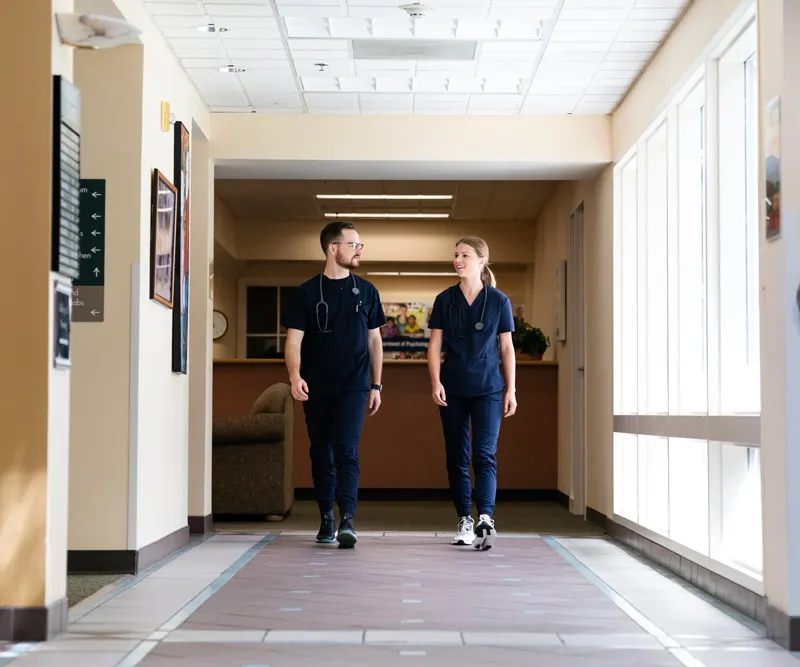
Fill a Critical Need
The Pacific Northwest is in dire need of CRNAs due to rising demand, insufficient numbers of MD anesthesiologists, low numbers graduating from existing programs and impending retirements. According to the Oregon Association of Nurse Anesthetists, more than 80% of rural Oregon’s anesthesia care is provided by CRNAs. Increasing the number of CRNAs is critical to helping vulnerable populations and tackling the high cost of surgical care.
Anesthesia care managed by CRNAs is more affordable than physician anesthesiologist care and produces comparable patient outcomes. As a CRNA, you’ll be fully qualified to manage anesthesia care for most surgical and obstetrical cases – and with our Doctor of Nursing Practice degree, you’ll meet the educational standard of a profession that will require a doctorate by 2025.
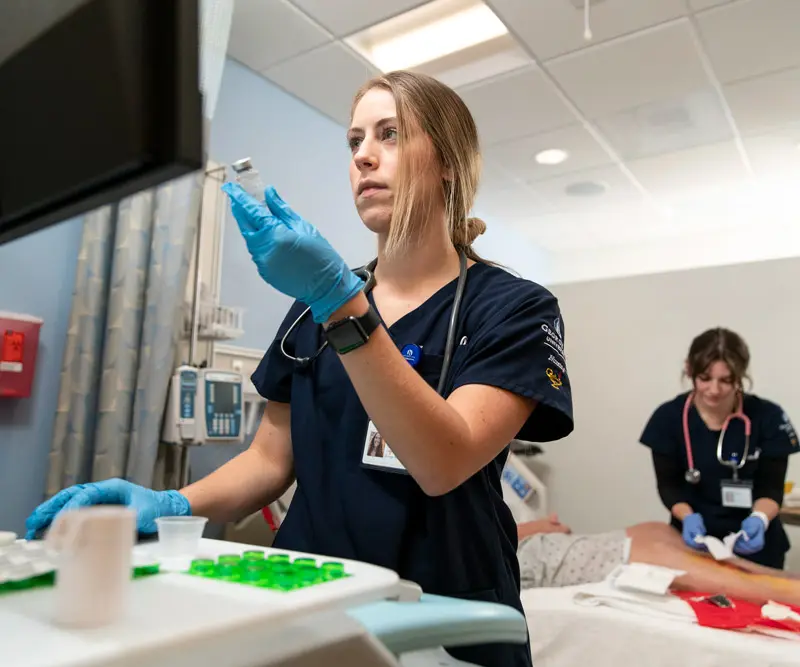
Thrive in a Growing Field
Given the increasing need for CRNAs, it’s no wonder that the Bureau of Labor Statistics (BLS) projects a significant number of job openings nationally between now and 2029. On a local level, the Oregon Employment Department reports that there were 293 CRNAs practicing in the state in 2021, with a projected demand of 359 by 2031 – a 22% increase.
According to 2023 BLS data, the median salary for CRNAs is $224,520 in Oregon and $212,650 nationally. Wherever you choose to practice, you’ll do good – and do well.
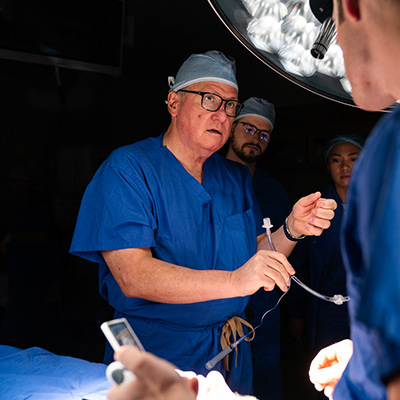
Bill Prosser
CRNA program director
The rural focus of the George Fox anesthesia program will empower our students to take the latest technologies into rural America and assume leadership roles in their communities. It’s the perfect marriage of science, healthcare, technology and human empathy.
Questions?

Ty Sohlman
Admissions Counselor
Request Info
 Loading...
Loading...
George Fox University is required to make cost of attendance (COA) information publicly available on this website.
